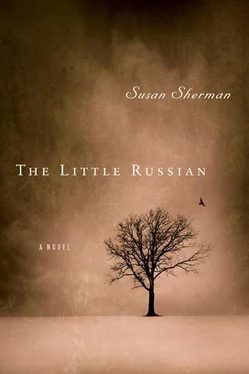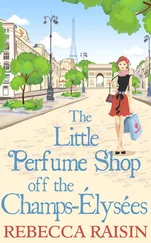The boy slid down below the sill and lay there panting and nauseous. His heart battered against his chest while the room swelled and contracted like a living thing. In the next instant he felt the warm flood of urine, and tears spilled down his cheeks. His gaze fell on the knife that lay glinting on the floor near the prostrate figure of the widow Yehsohua. She moved it away and held a finger to her lips. He didn’t argue with her; his hands remained limp at his sides, his legs useless, his eyes fixed on the dull handle of the knife.
Outside a bottle smashed against the building. The two men were arguing about where to find more vodka. When the boy looked out again, he saw them dragging his father off, a tambourine keeping time with their footsteps. As they began to fade into the gloom, the boy thought he saw his father look back once, only once, before they shoved him out to the street.
Part One
THE LADY FROM MOSCOW
September 1903
EVERYONE KNEW that if you wanted to reserve a first-class compartment all to yourself, you had to buy four tickets in advance. And since Berta Lorkis had been dreading this long trip for months and months, every excruciating aspect of it from beginning to end, there was some consolation in the fact that four first-class tickets would be waiting for her on the foyer table the morning she left Moscow.
She came down on the left side of the double marble staircase, always on the left for descent, her footsteps echoing off the high ceiling, her hand gliding over the lotus flowers carved into the banister. There wasn’t another house in Moscow with a foyer like this one, with its Egyptian columns each topped by a brilliantly colored sphinx. She couldn’t be sure, but she doubted if there was another one like it in all of Russia. Even though she didn’t design it or build it or even own it, she lived in it. It was the address she gave to cabmen and new acquaintances, the room that greeted her visitors when they first arrived, and that was enough for her.
It was early and the house still smelled of late-night bliny, smoked sturgeon, and cigars from the party the night before. There was a wineglass in the corner behind a chair and one up on a window ledge; a few stray ostrich feathers littered the floor. Under a mass of orchids on the amber table was a cream-colored envelope containing four first-class tickets, a note wishing her a safe journey, and two hundred rubles. The note was from Rosa Davidovna, the matriarch of the Malkiel brood and a second mother to Berta. Berta hadn’t expected the crisp fifty-ruble notes.
The coachman in his bottle green caftan opened the front door and announced that the luggage had been loaded and the carriage was waiting. She thanked him and put the envelope in her traveling case. When he was gone she checked her hat in the mirror that hung over the table. She had been right to wear this outfit. The color suited her and the skirt fit her like wax. She checked the back to make sure her belt was straight and fluffed up the flounces on her skirt. She made it a rule never to wear wire in her collars, only whalebone, only lace-trimmed satin petticoats that wouldn’t rustle, and only straight in front corsets. She always gave herself nearly a quarter of an hour to put on her gloves, because they fit her that well.
Berta met the coachman at the bottom of the steps, where he had the carriage door open. He took her traveling case and placed it on the seat inside and then took her arm just under the elbow and helped her into the carriage. It smelled of Mendel Afanasrevich’s lime shaving soap and the boot wax that his valet favored. There were fur rugs and a leather lap blanket neatly folded on one side of the seat and a newspaper that had been carelessly dropped on the floor. She folded it back along the seams, smoothed out the corners, and laid it in her lap. It would pass the time on the train.
The coachman climbed up on the box, clicked his tongue, flicked the whip, and the coach lurched forward. Soon they were crossing the Bely Gorod, heading down Nikolskaia Street and on through the Garden Ring to the Arbat. Here were many multistoried limestone buildings decorated with black signs in gilt lettering announcing the names of the stores in Russian and sometimes in French. Bells rang out from the numerous churches, proclaiming the hour each in their own way while horse-drawn trolleys clanged up and down the street depositing passengers on nearly every corner and picking up more. They continued on across the Borodinski Bridge, to Berezhki Street and then on to the Bryanski Station, where Berta was to catch the train west to the Ukraine, or Little Russia, as it was called.
Berta, like so many Great Russians, thought of Kiev and the surrounding provinces as a Russian outpost: provincial, backward, but Russified to some extent. She had a respect for both the Polish and the German influences there, but agreed with the authorities that the Ukrainian culture and language had little to offer. It was banned in the schools and in the government institutions and was thought to be the purlieu of reprobates, lazy slum dwellers, and rustics. Berta was born in Little Russia, a small fact that she never bothered to share with anyone of consequence. She was a Great Russian, as anyone could see by her fierce accomplishments, tasteful dress, and overall refinement.
Throughout the two-day journey from Moscow to Smolensk and Gorbatchovo to Bakhmatch, Tchernigov, and Kiev, Berta spent her days alone in the comfort of her compartment, reading, sleeping, and watching the dark pine forests of the northeast gradually give way to the undulating farmlands in the west. She luxuriated in the solitude and savored the feeling of disconnection, of being suspended between two worlds, a stranger to all, without ties and the expectations that went with them. Then, about 130 versts south of Kiev at a wheat center called Cherkast, an intruder appeared at the door of her compartment. She was a red-faced woman in light-colored muslin, looking hot in an embroidered bolero jacket and high-collared shirtwaist and wearing a hat so enormous, so generously laden with feathers, artificial flowers, and tropical foliage, it was a wonder she got it through the door.
“Sorry, this is a private compartment,” Berta said, with a note of alarm when it became apparent that the woman meant to move in with her traveling case, parasol, and numerous packages.
The woman stopped fanning herself with her ticket. “It is?” She shifted her packages to examine her ticket and checked the number on the door. “But this is number five. I’m in number five.”
“That is impossible. I booked the whole compartment.”
“You did?”
“Of course.”
As it turned out, the woman’s ticket was marked for Berta’s compartment. By rights the railroad should have corrected the mistake and accommodated the lady elsewhere, but the train was full and there was no place else for her to go.
“I am so sorry to intrude,” she said as she came back in, taking the seat across from Berta and spreading out her things on the surrounding seats. “I won’t get in the way. You’re so kind to offer me a place.”
Berta gave her a cold, quick smile and tried to ignore the vulgar rustling of the woman’s taffeta petticoats. At that point she could’ve made a fuss, but she was young and the woman was old, at least over forty, and she had learned from experience that waiters, cabmen, and guards on trains always placed age above beauty. She could’ve chanced it, but in all likelihood she would’ve lost and then she’d have to spend the rest of the journey with a sullen fat woman not three feet away. So reluctantly Berta accepted her fate with something approaching equanimity.
Читать дальше












